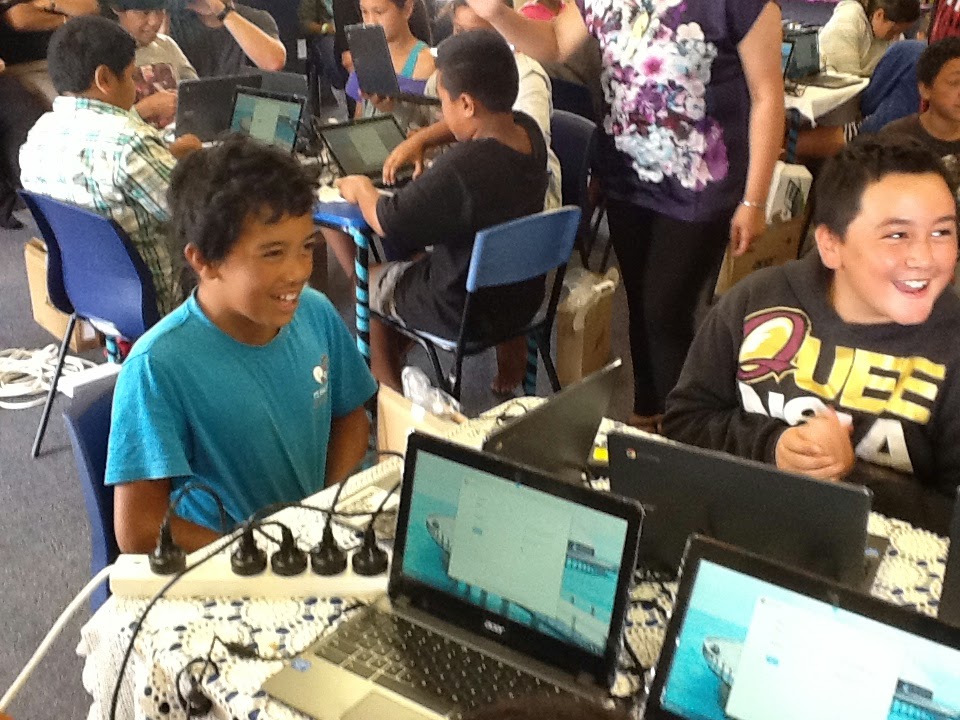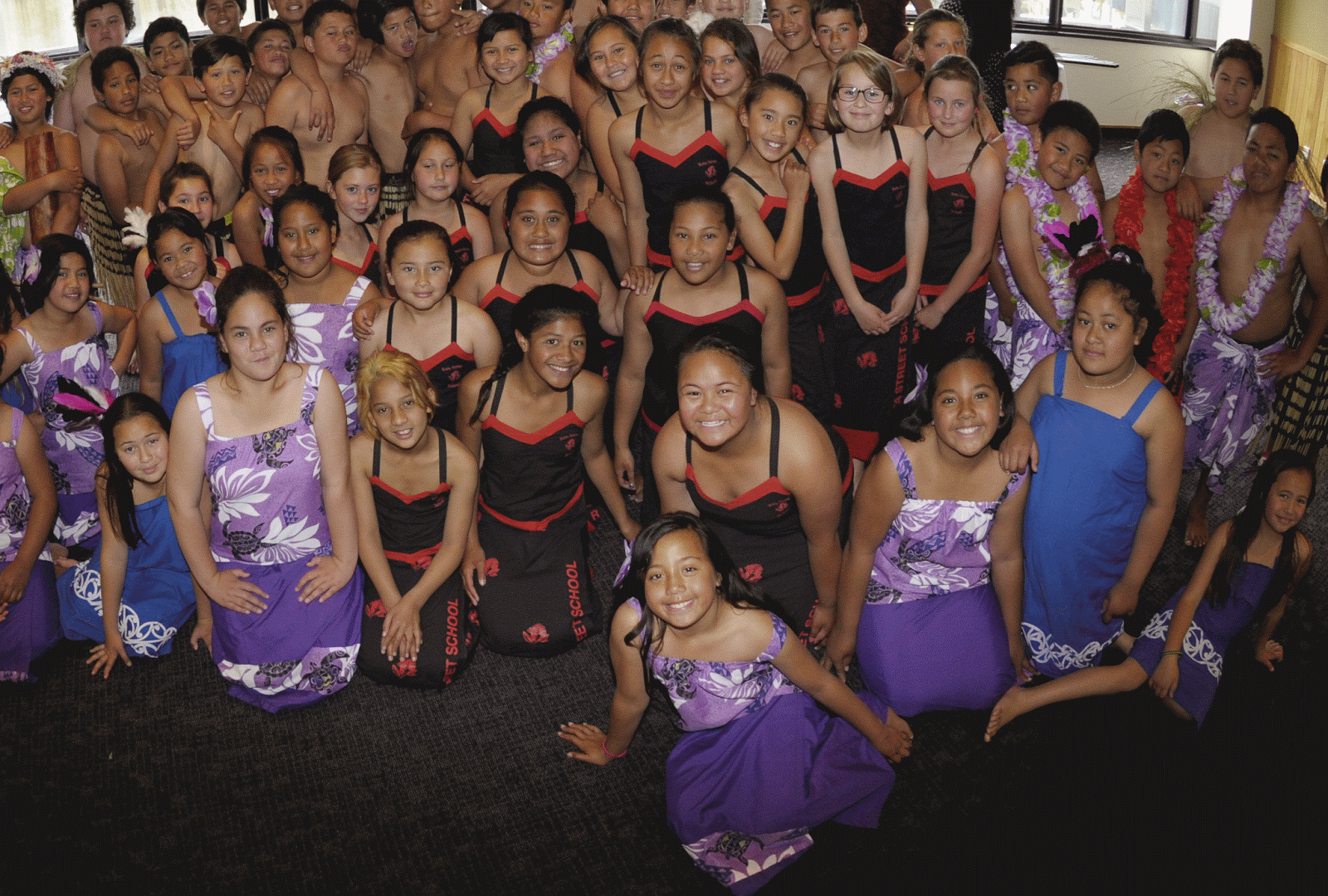 |
|
Chromebook
Day. Students at Tautoro School unwrap their
Chromebooks and log in to a whole
new way of learning.
|
A $130,000 Rotary grant has enabled a Far North education trust to expand
a revolutionary internet-based teaching system across the region. Paihia
School, Kawakawa School and Northland College will join a group of low-decile schools leading the
introduction of ‘digital classrooms’ when they open at the start of the 2015
school year in February.
The initiative, led by the Kaikohekohe Educational
Trust, seeks to improve academic results and reduce truancy. The founding
principals are Jane Lindsay, principal of Paihia School, Lee Whitelaw, principal
at Ohaeawai Primary, and Meralyn Te Hira of Kaikohe West School.
It gives
children from disadvantaged backgrounds the opportunity to embrace the wealth
of learning resources available on the Internet and to learn anywhere, any time
and at any pace. At its heart is the concept of learning by sharing, something
the internet has made much more possible than before.
The grant from the international Rotary
Foundation is being administered by the Rotary Club of Kerikeri. It will enable
hundreds of Chromebooks to be introduced into many more schools now and in the
future, and will fund the implementation of the
project and the training involved.
Chromebooks are laptop computers with
limited offline capability, designed to be used
primarily while connected to the Internet. They are the face of the
‘digital classroom’ system and provide access to a closed and secure
environment where sharing, pivotal to this new approach to learning, can take
place.
The digital classroom concept was introduced
to New Zealand by the Manaiakalani Education Programme, an initiative promoting
new learning approaches across a growing cluster of decile 1a schools in the
low income, predominantly Māori and Pacific communities of East Auckland.
The Kaikohekohe Educational Trust has
already introduced the new system in three Far North schools; Kaikohe West,
Ohaeawai Primary and Tautoro. It has been in place here for a year.
more
chromebooks
- 2
Mrs Lindsay says students at these
three flagship schools have already demonstrated higher levels of engagement
with their studies and a greater willingness to talk about what they are
learning and what it means to them. Parents are more engaged, too, and truancy
levels have dropped substantially.
Students say their Chromebooks keep all
their work in one place, it keeps their work neat and tidy (unlike their desks
used to be), and they are digital citizens so they love them. Students are
reading more, writing more and far more engaged – this is resulting in improved
outcomes in all curriculum areas. Students are sharing their work and learning
from one another. Furthermore, parents and whānau have access anywhere, anytime
so they can be involved in their child’s learning and support them.
“It’s not a replacement for
old-fashioned education values,” Mrs Lindsay said. “It is a replacement for
old-fashioned education techniques which have been failing our children for far
too long.”
Kaikohe East School, Bay of Islands
College and Okaihau College have expressed interest in the Kaikohekohe Learning and Change Network. It is
anticipated that numerous other local schools will join in the next few years.
Any school can apply to join the network but its approach is geared to be of greatest benefit
to lower-decile schools.
The $547 Chromebooks come loaded with
all the software and teacher management tools needed for students to share
their work with their peers, pupils in other schools in the network and with
their teachers. They also come with a three-year warranty and a robust case.
They will belong to the Kaikohekohe Educational Trust until they have been paid
for by the students’ parents. The parents of every child signed up to the
programme must agree to make repayments of at least $3.75 a week.
The scheme is not mandatory but Mrs
Lindsay said take-up had been “close to 100 percent” in the three Far North
schools in the network so far.
She said many of the students’ families
had no access to computers or the internet.
“If a large
proportion of them had devices at home we’d have followed the Bring Your Own
Device (BYOD) model, but the single-device Chromebook model is the best model
for these schools in this community. By reducing choice we have increased opportunity,”
she said.
The Rotary grant will
be used primarily to fund the implementation of the project, the extensive
training and professional development of the many teachers involved, and the
salary of a facilitator and a part-time administrator identified as essential
to its success.
more
chromebooks
- 3
The money has been
raised by Kerikeri Rotarian Keith Day, using a Rotary Foundation
project-funding mechanism which draws on various ‘pots’ established by various
Rotary administrative zones around the world. The Rotary clubs of Kerikeri,
Kaikohe and Bay of Islands have all contributed to the project, as has the Harold
Thomas Trust and several other community Trusts
across the region.
“This is a classic example of the power of the
international Rotary network being accessed in support of a worthwhile
community project,” said Kerikeri club President Bruce Mathieson. “There is
absolutely no way our various Far North clubs could have made this happen on
our own. Not a chance.
“What Keith has
done is to focus the attention of the massively influential Rotary Foundation
on our little corner of the planet – and our children have emerged as winners.
Big time.”
Mrs Lindsay said the
Rotary grant had given the Kaikohekohe Learning and Change Network “traction”
which otherwise would have taken many more years to achieve.
“What Rotary have
done for us borders on unbelievable,” she said. “They’ve allowed us to
fast-track the implementation. Without them we would have been really
struggling.”
For enquiries
please contact:
Peter Heath, Due North
09-4074695 / 021-45635























